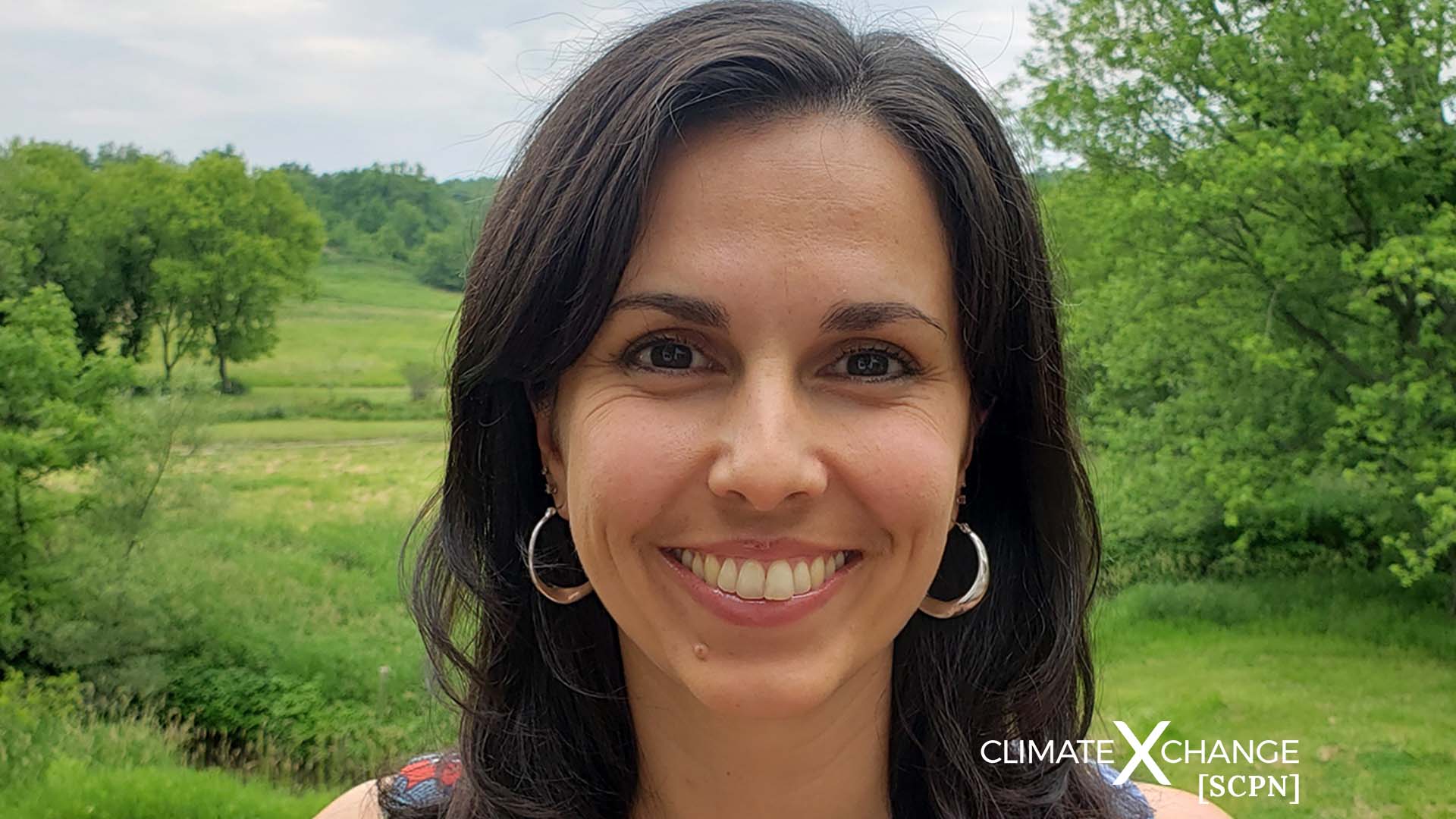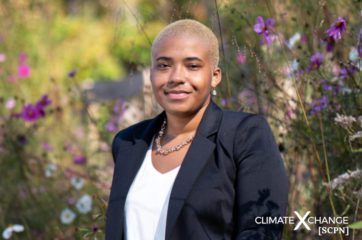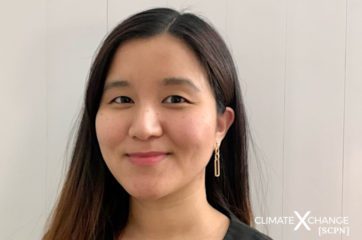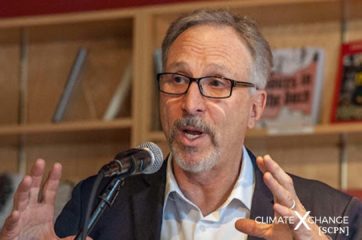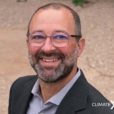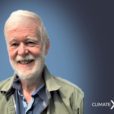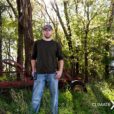All across the country, members of our State Climate Policy Network (SCPN) are fighting to make an impact on climate change in their communities. We have individuals in our Network from all 50 states, each experiencing climate change differently in their local areas and finding unique solutions to build resiliency efforts.
Chelsea Chandler is the Director of Climate Solutions at Clean Wisconsin, a non-profit organization working to preserve clean water, air, and natural heritage across the state of Wisconsin. We spoke to Chelsea about her work advocating for climate solutions, which she describes as translating the complexities of climate change to bridge the gap into policy solutions.
Claire Hetzel: To get started, could you tell us a little bit about yourself and how you got involved in the climate space?
Chelsea Chandler: Right now, I am the Climate Solutions Director at Clean Wisconsin, a statewide nonprofit in Madison working for clean air, clean water, and natural heritage. I have slowly moved from more technical work to policy over time. I started out from more of a science angle — I studied atmospheric science in college and worked in consulting around air pollution. I quickly realized through working on a proposed project and looking at an environmental impact review that I felt like the work I was doing was the technical analysis, and that I didn’t really have a say in whether the project was going to go forward or not. What initially drew me to science was that I liked how it was very pure and unadulterated by all the human messiness. But I realized through that position that I wanted to work in that messy space, because that’s how things get done. I didn’t want to just be studying the work, I wanted to affect it.
I went back to school and got a degree in environmental management. At that point, I started to do more work to bridge science and policy. I worked for a think tank and was still doing some more of the technical work, but it was more policy relevant — doing modeling for how a city could become carbon neutral, and helping with trainings on climate mitigation opportunities at the country level for the United Nations Framework Convention on Climate Change (UNFCCC). I then moved to Wisconsin in 2013 for a separate reason, my husband and I wanted to start a farm. That’s the other half of what I do, we run an organic Community Supported Agriculture (CSA) farm. When I got to Wisconsin, I was able to get another job working in the energy space. Then about a year and a half ago, I had the opportunity to join Clean Wisconsin, and now I am doing a lot more advocacy for climate action. I’ve slowly evolved over time from pure science to more of the way we evaluate our energy system and transportation to shape climate goals and drive action towards them. So, that’s been my trajectory.
Claire Hetzel: That’s a really interesting journey. I definitely want to hear a little bit more about your community farming experience. That sounds really cool!
Chelsea Chandler: I transitioned more to working on policy, which I think is critically important. There are a lot of things that are happening voluntarily and there are things that are happening because of economics. But ultimately, for things to happen as fast as the science tells us they need to, I think we need more policies that are driving us there and accelerating things. But that said, the policy world can be slow moving. It can be two steps forward and one step back, or sometimes one step forward and two steps back. It’s critically important, and I want to be involved in that, but it can also be nice to do something that’s more immediately gratifying. I feel like we get that out of the farm. There’s something very tangible which pairs nicely with the abstract policy work. When I am pulling up some carrots, or whatever it is, I know that that day, my hands grew something that is going to benefit the health of my land and benefit the health of my community.
Our CSA has 75 members who sign up for a subscription at the beginning of the season and they get 20 boxes during that season of food harvested fresh from the farms, whatever is ready that week. They get a real diversity of fruits and vegetables, and it’s all organically grown. I think our farm, and many farms, are great environmental stewards. Because of my work in the climate world, we’re especially mindful of environmental stewardship. We’ve done a lot of conservation on our farm. We have a beautiful prairie remnant and wetlands that we take care of. We implement a lot of the natural climate solutions that I advocate for in my office job here on our farm by using things like cover crops and grass waterways, things that help slow down water runoff and keep all those nutrients in the soil where we want them, not in the waterways. We’re also building up soil carbon in our land and using the land as a sink, rather than a source of emissions. It’s neat that we get to use the farm as a living laboratory for a lot of ideas.
Claire Hetzel: Going back to your work with Clean Wisconsin, could you give us a snapshot of what you do? How has your previous experience leading to this position helped you, especially working with decision makers or stakeholders, and that sort of messiness that you talked about earlier?
Chelsea Chandler: I am the Climate Solutions Director, so a lot of my job is setting our climate strategy and coordinating across our organization and with partners. At Clean Wisconsin, we have a team of around 20 people. We have a science department and a legal team, lobbyists, communications team, and a climate justice organizer, to make sure we’re all working together toward our goals. I do a lot of communications as well, talking to the media and helping to share information to shift public attitudes or inspire action. All of that orchestration is really essential to make sure that we’re working on the right things, highlighting important stories, and talking to people that are most impacted by environmental harms. Some of the things I’ve been working on recently relate to last year, when Wisconsin’s governor announced a Task Force on Climate Change. Clean Wisconsin was a member, and we were able to help shape the recommendations that came out of that process. They were as strong as possible and had wide buy-in, with public turnout that had 1,000 comments from nearly every county in the state. That was a really successful process. We ended up with this great list of recommendations and now we’re working on translating those into something actionable.
As part of a stakeholder advisory committee for the Clean Energy Plan, we’ll be working to uplift that plan and educate around it to promote some of the especially near term strategies, and those that are going to have really big impacts. We do a lot to advance supportive legislation around climate change. We’re looking at some bills now that address accessibility and expanded capacity for renewable energy, like community solar and third-party solar. There were a bunch of bills that just dropped recently and we were able to be at the release of those, which dealt with issues that came out of the climate change task force ranging from carbon sequestration and sustainable agriculture to increases in funding for statewide energy efficiency and renewable resources programs, and looking at the social cost of carbon in the Public Service Commission. We’re working in a lot of different venues, whether that’s through the Public Service Commission or the Office of Sustainability and Clean Energy. We are working on a partnership with utilities to accelerate the transition away from fossil fuels and to expand renewable energy. We’re doing work around natural climate solutions too. Wisconsin is a huge agricultural state and we have really important northern forests. There’s a lot of opportunities for us to lower our greenhouse gas impacts and have the land serve as a net sink.
Claire Hetzel: What’s one of the biggest challenges for you when you’re doing this work with stakeholders or legislators?
Chelsea Chandler: The biggest challenge is urgency. We know where we need to get to and our state now has a goal for 100 percent carbon free electricity by 2050. But there’s different ways to get to 2050. My biggest challenge is accelerating action and making sure that we get not just to that 2050 goal, but also get to 2030 goals and 2025 goals, what can we do sooner than 2050. That has implications for the energy sector transformation — we’re not just talking about phasing out coal, we’re also talking about avoiding gas as a bridge fuel. There are also a lot of debates still around about the ideal way to make that energy transition. I think that it’s a challenge for people looking at what an ideal situation is, and grappling with some of our current challenges and some of the trade-offs. Helping to articulate some of the costs of inaction can be really useful, because a lot of the landscapes that we want to protect, in the case of utility scale renewables, for instance, have a larger footprint right on the landscape.
There’s disagreement in communities about whether or not that is a good thing. But at the same time, if we are not treating the climate crisis as a crisis and working urgently to transition, then we are going to see even more impacts on these important landscapes and these special places that we call home. At the same time, we know that the people that have contributed least to the problem are the ones that are suffering the most and facing the worst impacts, both from climate change and the correlated air pollution and health impacts from both of those. The status quo isn’t necessarily worth maintaining, so that’s another challenge to bring in those bigger perspectives and bridge some of those divides to understand what’s at stake, since inaction actually is an action in itself.
I’ve always tried to be kind of a connector and a translator, I embraced that as part of my background because I have the perspectives from both science and policy. I have lived in a lot of urban settings, but for the last eight years I’ve lived in a very rural area. I have a mixed ethnic background as well and always felt like I was kind of translating between my parents and so I feel like being able to kind of exist in those middle places, I can help be a translator for some of the complexities in all the different sectors and actors involved in really vexing problem like climate change.
Claire Hetzel: I think in Wisconsin, translation is needed at times! And given the hyper-political polarization in Wisconsin, particularly, but also nationwide, how detrimental is that to passing climate policies? You also mentioned the goals of carbon free by 2050, how do we put those goals into specific action plans?
Chelsea Chandler: The political polarization is really tricky. Some challenges that we’re seeing is that our leadership is not always acting on the demands of the people and not truly representing those interests. We know from polls nationwide that most Americans do care about climate change, they’re concerned about it, but you might not know that from the way that some of our representatives vote, both at the state and national level. I think right now, federally, we’re seeing some very exciting developments with both the infrastructure bill and build back better.
At the state level, it can be challenging. Earlier this spring, Governor Evers proposed a number of initiatives related to climate change and clean water, and they were immediately stripped out of the state budget. But there are other ways to advance action, like I mentioned, the Clean Energy Plan is coming out soon and we’ll be able to use that as a roadmap for action that we can take in different venues. The legislature is one avenue, but there are also processes that we can work through at the Public Service Commission. There are things other state agencies can do and coordinate, studies that can be commissioned, and voluntary work that we can participate in with utilities.
There’s also organizing and outreach that is going to help change attitudes of those decision makers and people that are really empowered to pass policy. I think more and more, we’re going to see more conservative politicians treat climate change as more of an emergency because increasingly, their constituents are requiring them to. There’s an active conservative energy forum in Wisconsin that’s making the economic case for renewable energy, which is pretty compelling. And then youth across the board, not just the liberal youth vote, but folks that are more conservative are recognizing that this is their future and they care about the issue, and they’re going to demand change. There’s increasing accountability from constituents and I think that’s going to be more and more true over time. I don’t think we’re moving fast enough in a bipartisan fashion, but there are some areas where we agree, and we’re making progress. And I think that in the near future views will change and people will treat it as more of an urgent issue across the board.
Claire Hetzel: Are there any opportunities right now for bipartisan support in the legislature?
Chelsea Chandler: There are some bills that are out right now that were introduced by Republicans. I mentioned there is a huge package that was released by Democrats recently, and they’re seeking co-sponsorship so Republicans could still join onto those too. But there are also some bills related to renewable energy, clean solar, and third party solar that were released by a Republican. There are also some bills out right now related to electric vehicle charging and sales, and those have good bipartisan appeal as well.
Claire Hetzel: Is there anything else you’d like to mention about your advocacy work at Clean Wisconsin or any final thoughts?
Chelsea Chandler: Like I said before, we need to work faster and work in all the places. I’m really encouraged by the public demand for accountability and youth movements. We need to keep pushing the people in charge and the people who are contributing the most to the problem, whether that is our decision makers and our elected officials or the companies that have an outsized impact or their emissions. There’s always a tricky balance between accepting some compromise and incremental change, and working towards longer change while making sure that incremental change isn’t undermining transformational change further down the line.
There’s so much opportunity and when we’re not seeing action at the state level, we see lots of action locally. We saw that in Wisconsin, prior to this administration when we didn’t have much leadership on climate change. We saw lots of cities across Wisconsin adopt 100 percent renewable energy goals and share lessons with each other on how to source more renewable energy and transition their transportation systems into cleaner and more accessible systems. I think we’re finally seeing more talk, as well as some real action, towards equitable solutions and making sure that the folks that have been most impacted by environmental harms have the support and platforms that they really deserve because they are living these experiences and can craft the best solutions that we can implement across the board.
The last thing I’ll say is, I hear people talk a lot about finding hope in the climate space, because it can feel pretty dreary working on a really existential issue like this. But there’s a climate scientist, Kate Marvel with NASA, and to paraphrase her, she says that what we need is not hope, but courage. And the opposite of hope isn’t despair, it’s courage and action. In the face of a scary problem, like climate change, and one where we know we’re already seeing negative impacts and that we’re going to see impacts for years to come, no matter what we do today, that can feel paralyzing. But I think the important thing to remember is that the difference between hope and courage is that we’re not waiting for things to change, but we’re going to roll up our sleeves and we’re going do it. I think that’s what motivates me most days, because we’re doing something about it and that can make you feel more empowered, and it does make you feel more hopeful. You know that you’re working on things with so many other people in your community and across the world, and that’s going to add up to something important.

